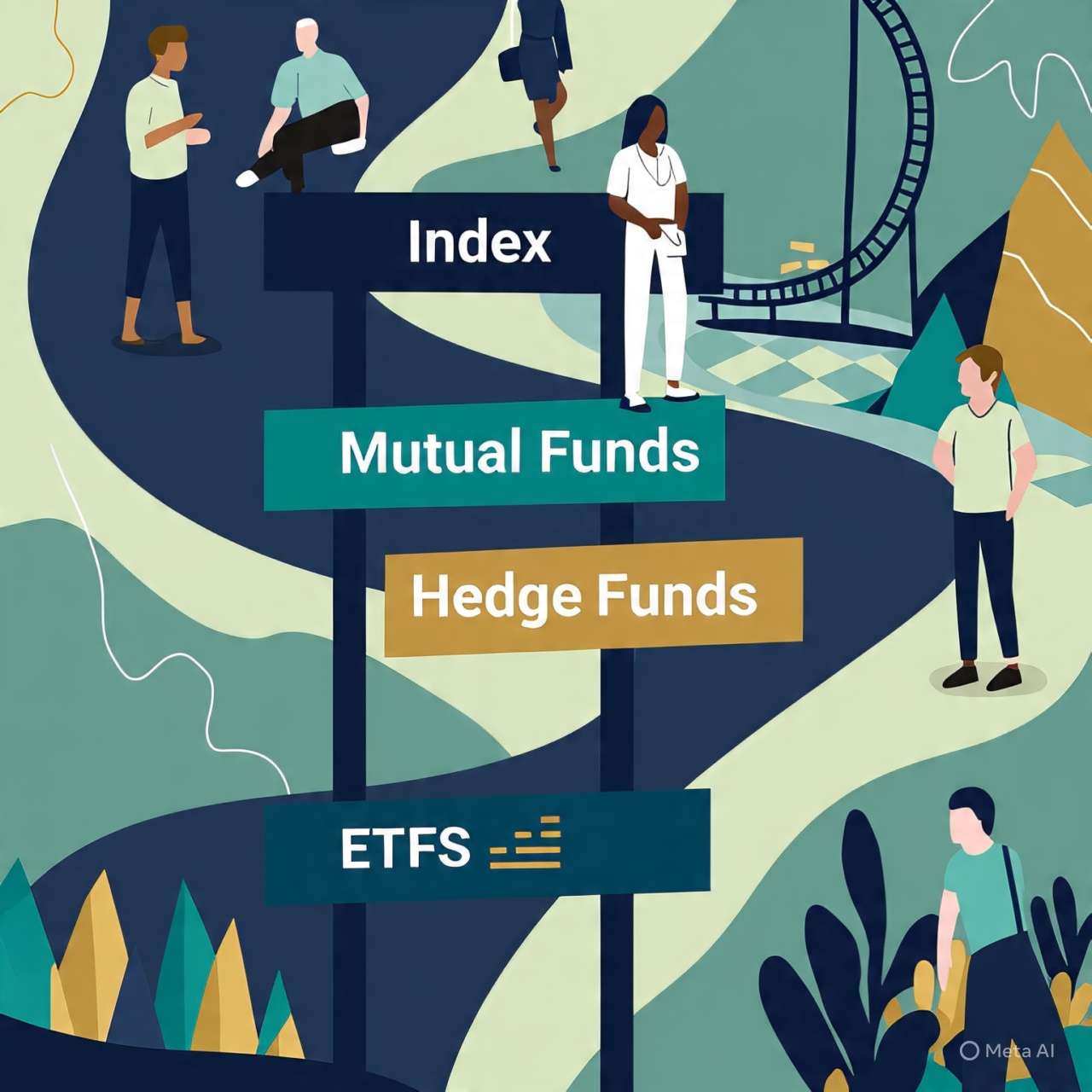- 7 July 2025
- No Comment
- 929
Which Fund is Right For You: A Simple Guide

Are You Confused About Which Funds to Invest In?
Imagine this: You want to start investing. You’ve heard friends or finance influencers throw around terms like “index fund,” “ETF,” or “hedge fund.” But when you sit down to actually understand them, it feels like you’re reading a foreign language.
You’re not alone.
In fact, millions of people face this same dilemma every day. What’s the difference between an index fund and a mutual fund? What makes ETFs so popular? And are hedge funds really just for the super-rich? If these questions have ever crossed your mind, you’re in the right place.
This article breaks it all down to simple explainations, so even if you’re just starting your financial journey, you’ll walk away feeling informed and empowered.
What Is a Fund, Anyway?
Let’s start at the very beginning. Think of a fund like a group party.
Say you and ten friends decide to throw a birthday bash. Instead of one person paying for everything, everyone chips in. Together, you’ve got a budget big enough for food, drinks, decorations, and even a DJ. That way, everyone enjoys the full experience without the stress of managing it solo.
That’s essentially how an investment fund works.
A fund pools money from multiple investors. That combined amount is then invested into a basket of assets, stocks, bonds, real estate, or a mix of all. Rather than picking and managing each investment on your own, the fund does it for you. In return, you share in the profits (or losses).
Index Funds: The Low-Stress, Long-Term Favorite
What Are Index Funds?
Index funds are the investment world’s equivalent of “set it and forget it.” Instead of trying to beat the market, they mirror it.
An index fund simply follows a market index, a curated list of companies that represent a portion of the economy. The most popular one? The S&P 500. It tracks 500 of the biggest, most successful companies in the U.S.
So when you invest in an S&P 500 index fund, you’re automatically investing in companies like Apple, Amazon, and Microsoft. No guesswork. No constant buying and selling.
Why Investors Love Index Funds
- Low Fees: Index funds are passively managed. There’s no high-paid fund manager making daily decisions. As a result, the annual fee called the expense ratio is super low, often between 0.02% and 0.20%.
- Diversification: Your money isn’t riding on one company. It’s spread across hundreds. If one company struggles, others can balance it out.
- Proven Performance: Over time, index funds have consistently performed well. Even investing legend Warren Buffett recommends them for most people.
One Thing to Keep in Mind
Unlike stocks or ETFs, index funds are only priced once a day, after the stock market closes. That price is called the Net Asset Value (NAV). So if you place a buy or sell order during the day, it will go through later at the NAV, not immediately. This setup is fine for long-term investors, but it’s good to know.
Mutual Funds: Active Strategy with a Price Tag
What Are Mutual Funds?
At first glance, mutual funds look a lot like index funds. They pool money from investors and spread it across many investments.
But here’s the twist: mutual funds are usually actively managed. A professional or a team makes investment decisions, aiming to outperform the market.
Pros and Cons of Mutual Funds
- Pro: Potential for higher returns if the fund manager makes smart choices.
- Con: Higher fees. Expense ratios for mutual funds typically range from 0.5% to 1.5%, sometimes more.
- Pro: More targeted investments. Some mutual funds focus on niche areas like emerging markets, healthcare, or green energy.
- Con: Not all mutual funds beat the market. In fact, many don’t.
Just Like Index Funds
Mutual funds also settle at the end of the trading day. Your order gets processed after markets close, not instantly. And while mutual funds offer diversity, they often come with more unpredictability.
Hedge Funds: High Risk, High Reward
What Are Hedge Funds?
Now we’re entering elite territory.
Hedge funds are private investment vehicles that pool money from high-net-worth individuals or institutions. Unlike index or mutual funds, hedge funds use aggressive strategies, short selling, borrowing (leverage), and derivatives to chase big returns.
Why Hedge Funds Aren’t for Everyone
- High Minimum Investment: You typically need a net worth of over $1 million or a high annual income to even qualify.
- High Fees: The classic model is “2 and 20”, a 2% management fee plus 20% of the profits. Compare that to index funds charging just 0.1% or less.
- High Risk: With freedom comes volatility. Hedge fund strategies can lead to major gains, or major losses.
For these reasons, hedge funds aren’t designed for everyday investors. They’re for those who can afford to take big risks for the chance of bigger rewards.
ETFs: Flexibility Meets Simplicity
What Are ETFs?
ETFs, or exchange-traded funds, are often described as a blend of index funds and individual stocks.
Like index funds, ETFs offer diversification by investing in a group of assets. But like stocks, ETFs can be bought and sold throughout the day at real-time prices.
Why ETFs Are So Popular
- Real-Time Trading: Want to buy or sell at noon? You can. ETFs trade just like stocks.
- Low Fees: Most ETFs are passively managed, so fees are low—often ranging from 0.03% to 0.75%.
- Easy Access: Many brokerage platforms offer commission-free ETF trades, making them beginner-friendly.
Whether you’re interested in the S&P 500, tech stocks, or clean energy, there’s likely an ETF for it.
Which One Is Right for You?
Best for Beginners and Long-Term Investors: Index Funds or ETFs
If you want a low-cost, hands-off way to grow your money over time, these are your best bet. You’ll get broad market exposure with little effort and minimal fees.
Best for Active Strategy Believers: Mutual Funds
If you trust a specific fund manager’s strategy and don’t mind higher fees, mutual funds might be for you—especially if you want to invest in niche areas.
Best for Wealthy, Risk-Tolerant Investors: Hedge Funds
High fees, high volatility—but potentially high rewards. Hedge funds are for those who can afford to take the gamble.
Invest Smarter, Not Harder
The financial world doesn’t have to be intimidating. With the right knowledge, you can confidently choose the type of fund that fits your goals and comfort level.
Whether you’re just starting with your first paycheck or managing a sizable portfolio, understanding the difference between index funds, mutual funds, hedge funds, and ETFs is key to making smart, informed decisions.
So, take a moment today to evaluate your goals, risk tolerance, and timeline.
Then pick the option that feels right and start your investing journey with confidence.
Read more: Learn the Psychology of Money in 5 Minutes
5 Life-Changing Money Lessons You Were Never Taught in School




